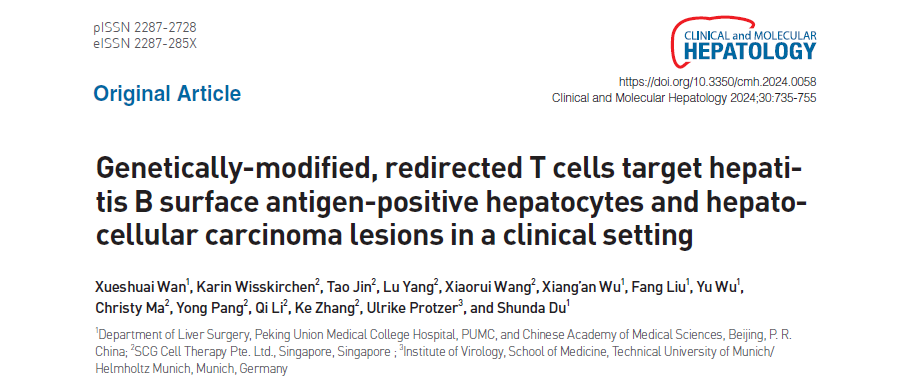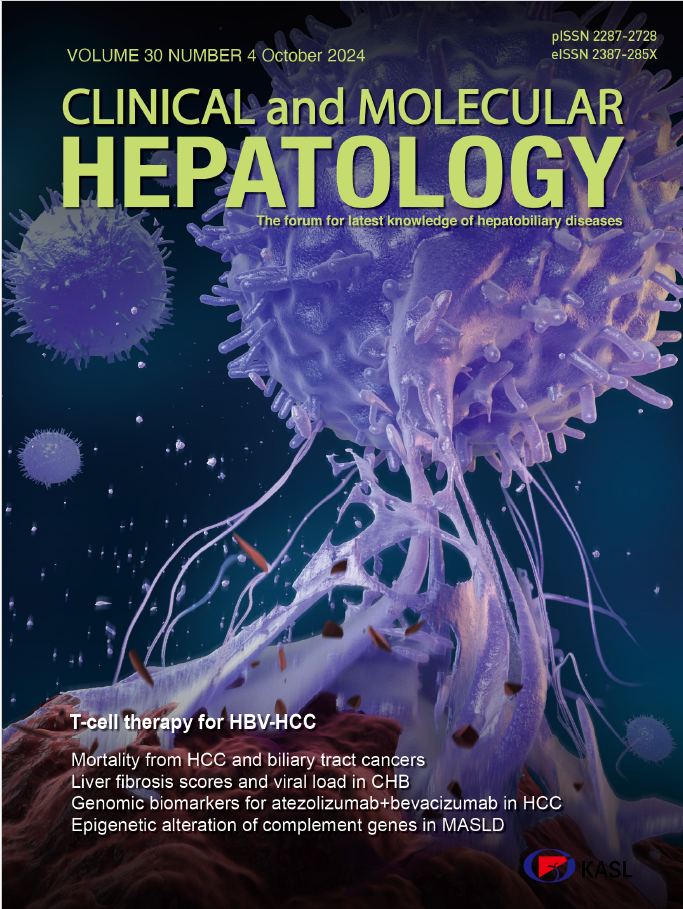
A research team led by Professor Du Shunda, Deputy Director (in charge of work) of the Department of Liver Surgery at PUMCH, conducted specific T-cell immunotherapy and long-term follow-up and observation on a patient with advanced HBV-related liver cancer. The study showed that the patient tolerated the therapy well, and partial remission was seen in the targeted tumor lesions. The research findings were recently published as a cover feature in Clinical and Molecular Hepatology (IF=14), a journal ranked among the top 5% by the Chinese Academy of Sciences.

Hepatocellular carcinoma (HCC) induced by hepatitis B virus (HBV) infection accounts for more than 85% of the total liver cancer cases in China. After HBV infects the human body, the viral DNA integrates into the host genome, which can lead to unstable expression of virus-related oncogenes in the host cell genome, inducing inflammation, oxidative stress, and other reactions, causing abnormal liver cell regeneration and ultimately leading to HCC. Currently, most liver cancer patients are already in the mid-to-advanced stage at the time of diagnosis, and only 20-30% of patients are eligible for radical surgery, with the five-year postoperative recurrence rate up to 50-70%. Patients with mid-to-advanced stage and recurrent liver cancer often find surgery challenging for them, thus needing multimodal therapy including radiotherapy, chemotherapy, interventional therapy, targeted therapy, and immunotherapy, though often with suboptimal efficacy.
HBV surface antigen-specific T-cell receptor (TCR) T-cell therapy (SCG101) involves isolating T-cells from the patient's body, processing them with specific techniques to amplify a large number of T-cells that can specifically recognize HBV surface antigens and have enhanced anti-tumor activity, and then infusing them back into the patient's body. In HBV-related liver cancer, more than 85% of cancer cells have integrated HBV DNA and continuously express HBV surface antigen (HBsAg), which can be recognized by SCG101. SCG101 can precisely target and kill HBV-related liver cancer cells to achieve the purpose of treating tumors. At the same time, it can also kill liver cells infected by HBV, minimizing the odds of recurrence of HBV-related liver cancer. SCG101 has shown remarkable anti-tumor and anti-viral activity in the laboratory and has been approved by the U.S. Food and Drug Administration, the National Medical Products Administration of China, the Health Sciences Authority of Singapore, and other agencies for clinical trials in HBV-related liver cancer.
After obtaining full informed consent and passing the review of the hospital ethics committee, the research team from the Department of Liver Surgery at PUMCH infused a single dose of SCG101 into an inoperable patient with advanced HBV-related liver cancer and continuously followed up for 6.9 months. During this period, the patient did not receive any other anti-tumor treatment.
The study found that the patient had tolerated the treatment well. Although there were transient adverse events such as liver function impairment, the damage was all reversible. On the 28th day after infusion, the researchers observed that the patient's targeted tumor lesions had shrunk by 66% compared to the baseline, meeting the criteria for "partial remission" as defined by the World Health Organization's "modified Response Evaluation Criteria in Solid Tumors" (mRECIST). At the 4th month after infusion, the targeted tumor lesions further shrank by 74.5% compared to the baseline, and another lesion completely disappeared. At the end of the follow-up, the tumor had not progressed for more than 6.9 months and remained in a state of continuous remission.
Starting from the 3rd day after infusion, HBsAg, the patient's HBV serologic marker, began to decline. Before infusion, the patient's HBsAg was 557.96 IU/mL. On the 7th day after infusion, it dropped to 1.3 IU/mL, and on the 28th day, it further dropped to 0.08 IU/mL, remaining below 1 IU/ml (HBsAg negative) during the follow-up period. At the 3rd month after infusion, the patient underwent a liver biopsy. No HBsAg expression was detected in the sampled specimens, suggesting that the HBV surface antigen-positive liver cells in the patient's body had been 100% removed. On the 7th day after infusion, a high percentage of stem cell-like memory T-cells proliferated in the patient's body and persisted for a long time, still detectable at the end of the follow-up. This suggests that the body has formed specific memory T-cell subsets that will continuously sustain the anti-tumor and anti-viral effects of SCG101 therapy.
Professor Du Shunda stated that this is the world's first clinical application of HBV-specific T-cell therapy in an advanced liver cancer patient, demonstrating encouraging efficacy and safety. The SCG101 therapy can eliminate HBV-positive liver cells and achieve sustained tumor control after a single administration, providing a new hopeful treatment option for patients with mid-late stage or recurrent HBV-related liver cancer. More rigorous and larger-scale clinical studies to validate the effectiveness and safety of this therapy are ongoing.
Written by Gan Dingzhu and Wan Xueshuai
